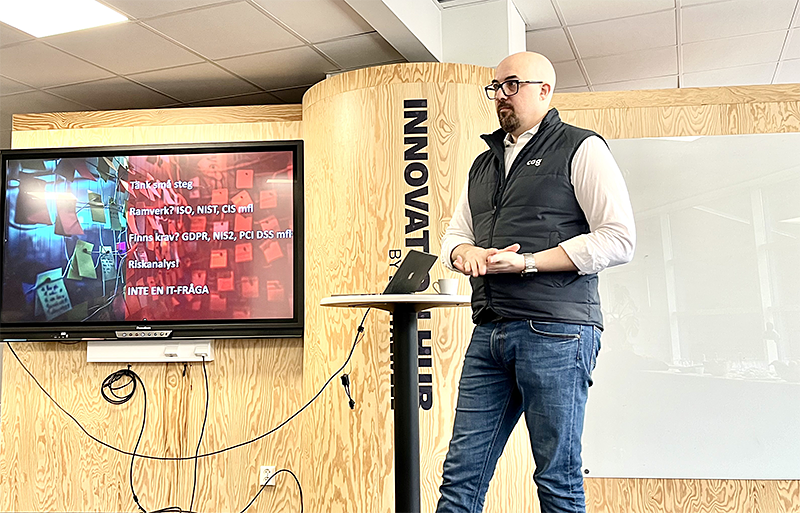During Compare’s cybersecurity networking breakfast on 11 April, experts in the field provided tips and advice on how to prepare and act against these threats.
Digital crime is growing today because there are huge financial gains to be made.
– We are becoming increasingly connected, which increases the vulnerabilities in our systems, hardware and software,” explains Jonas Axelsson, Consultant Manager at CAG Security. “In most cases, it is people who are deceived, often through phishing, where they are manipulated into sharing sensitive information.
Jonas points out that no one is immune to this crime. It affects everyone, regardless of background or position.
– “To effectively combat this, we need to discuss security and raise awareness at all levels of society.
He continues: “Education is key to minimising mistakes. It is important to prepare for the worst and to practice dealing with attacks. An investment and a budget are necessary. IT security will not generate money, but hopefully it will prevent the loss of money.
Training and methodological support
– “Creating a cybersecure organisation is not a quick fix, but requires continuous work,” says Erik Sundström, Senior Research Coordinator at the Swedish Civil Contingencies Agency (MSB).
MSB is the Swedish authority responsible for developing and managing secure communications, providing advice and support in information security work and managing and preventing IT incidents.
– “On our website, there is a well-developed methodological support for systematically working to improve your information security and cybersecurity,” says Erik. It includes everything from manuals and templates to training material and more.

Photo: Johan Eklund / MSB Stockholm
A valuable part of the support package is the Cybersecurity Checkup, a self-assessment tool that helps organisations map their information security maturity level.
– “It’s not just an inventory, but can also be a guide for planning and prioritisation,” Erik adds. By conducting the check-up regularly, organisations can track their progress over time and see the impact of their actions.
MSB also offers free web-based training programmes to help companies with skills development. One example is Digital Information Security Education for All (DISA), which is MSB’s information security training programme.
– “Using MSB’s training courses and methodological support is a good way to strengthen organisations’ skills development and security,” says Erik.
Read more about MSB’s methodological support for information security work.
Securing your personal data
When it comes to protecting personal data, it is important to take active steps to minimise the risks of data breaches. Leonardo Martucci, Associate Professor of Computer Science at Karlstad University, shared valuable insights and advice to prepare and protect against potential threats.
– “If you want to protect your personal data, there are several measures you can take,” explains Leonardo.

Leonardo Martucci, Associate Professor of Computer Science at Karlstad University.
A useful tool for detecting and preventing data breaches is the website haveibeenpwned.com. By entering their e-mail address, users can easily check if information has been leaked on the internet. The website notifies the user if their email address is included in known data breaches.
– “When your email address and password are combined, the risk of your accounts being breached increases,” explains Leo.
If you discover that your email address has been compromised, Leonardo recommends changing your passwords and using a password manager to effectively manage and generate strong passwords.
Several practical tips were shared by Leonardo:
- Update your systems: Make sure to keep your devices, such as phone, TV and computer, updated with the latest security patches.
- Make backups: Back up your files both locally and online to ensure you don’t lose important information in case of a breach.
- Use multi-factor authentication: Increase your security by using multi-factor authentication, which means using your phone to verify your identity.
- Be careful with links in emails: Avoid clicking on links you receive via email, as they can be a source of malware and fraud.
- Log out of online services: Make sure to log out of online services when you are not actively using them to avoid risks of unauthorised access.
- Be careful with QR codes: Avoid scanning QR codes from unknown or unsecure sources, as they may lead to malware or fraud.
- Avoid reusing passwords: Prevent hackers from gaining access to several of your accounts by avoiding using the same password for different services.
The event was funded by the Interreg Sweden-Norway project Cross Border Cyber Capacity, whose long-term objective is to contribute to increased awareness of the importance of digital security among companies and organisations and to facilitate new startups and spinoffs. By promoting innovation and collaboration, the project will play an important role in working towards a more secure digital future for businesses and organisations in Sweden and Norway.


